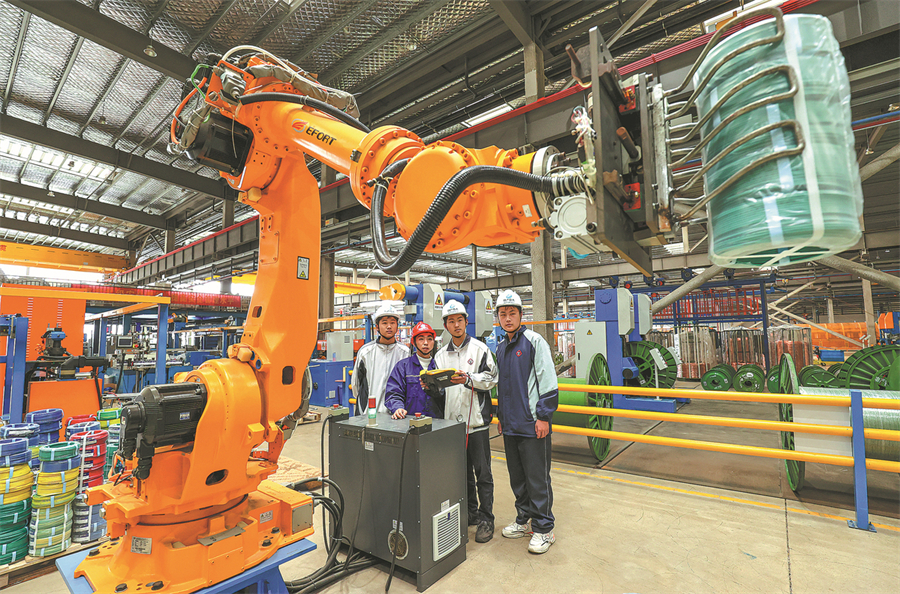More pilot cities to fall under vocational education roadmap

Students from a vocational school in Huzhou, Zhejiang province, learn how to operate robots in a local company. [Wang Shucheng/for China Daily]
China will select a second batch of around 30 pilot cities to integrate the industrial and educational sectors in the second half of this year as the country aims for greater numbers of skilled craftsmen, according to a guideline released by the National Development and Reform Commission.
The NDRC and seven other departments jointly published the guideline last week on an implementation plan to empower and enhance the integration of industry and education through vocational education between 2023 and 2025.
The guideline aims to better integrate industry demand into the entire process of talent cultivation and continuously optimize the supply of human resources, it said.
The guideline encourages banking institutions to support industrial and educational integration projects and aid related enterprises.
Insurance companies may devise related insurance products, and the government will support eligible industrial and educational integrated enterprises to seek public financing.
"Implementing the guideline can help promote high-quality development of vocational education in China, and cultivate more highly skilled technical talent and craftsmen for the building of a modern socialist country in all respects," Lin Yu, deputy director of the department of vocational and adult education at the Ministry of Education, said during a news conference at the NDRC on Tuesday.
From 2018 to 2022, national financial investments in vocational education reached 1.8 trillion yuan ($251.7 billion), with an average annual growth rate of 6.2 percent, the NDRC said.
During the 14th Five-Year Plan period (2021-25), the government will actively support the building of industrial and educational integration training bases through funds from the central budget.
For higher vocational colleges and application-oriented undergraduate colleges, the financial support shall not exceed 80 million yuan per school, and the support amount for each secondary vocational college shall not exceed 30 million yuan, the NDRC said.
Building a modern industrial system requires both top-notch scientists and highly skilled craftsmen rooted in the production lines. Due to their complex structure and numerous components, some cutting-edge fields such as aircraft engine manufacturing require a large number of skilled craftsmen from assembling engine blades to tightening screws, said Liu Ming, director of the social affairs department at the NDRC.
"Facilitating the integration of industrial and educational sectors through vocational education can help cultivate hundreds of millions of highly skilled talents, turn innovation into reality, and technology into productivity," Liu said.
Currently, China has more than 10,000 vocational colleges and over 30 million students. The scale of vocational education has already accounted for about half of China's higher education sector, indicating huge talent dividends. In recent years, the employment rates of graduates from secondary and vocational schools have exceeded 95 percent and 90 percent, respectively, according to the Ministry of Education.
"Vocational education has enabled more ordinary workers to join the middle-income group through their own efforts, playing an important role in ensuring people's livelihoods. It also serves as a form of employment education," Liu said.
In 2021, the government selected the first batch of 21 pilot cities for the integration of industrial and educational sectors and 63 enterprises for national industrial and educational integration.
As per the latest guideline, the government will summarize the experiences and practices of the first batch of pilot cities, and select another group of enterprises for national industrial and educational integration.
























